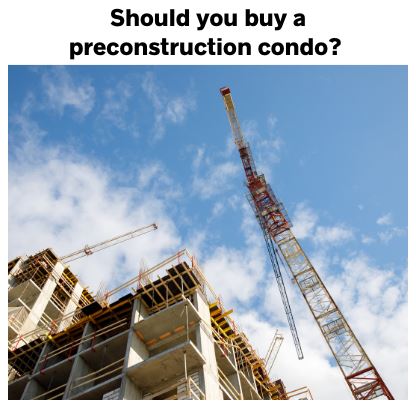
If you’re looking to buy a condo, there’s much to consider before starting your house-hunting journey.
The first decision will be whether to purchase a standard resale unit — or a condo that hasn’t even build yet. While it’s certainly not for everyone (and won’t suit anyone looking to
move in immediately), a pre-construction condo can have many benefits and drawbacks. Here are some of the pros and cons.
Higher Down Payment
You can put down as little as 5% towards the purchase price of a resale condo. And when it comes to a pre-construction condo, you’ll need a much more considerable amount.
You will often be required to put down at least a 20% down payment on a pre-build, although that amount will be in smaller installments over some time. For example,
a typical down payment schedule may look like this: $5,000 with the offer,a balance of 5% after 30 days, 5% in 90 days, 5% in 180 days, 2.5% in 365 days
and 2.5% is 550 days after signing the purchase agreement
Cooling Off Period
The cooling-off period on a pre-construction unit starts after putting down your initial (first) deposit. You have a short period to rethink your decision (ten days in Ontario and seven days in British Columbia).
Use this “cooling off period” to get your finances in order and have your real
estate lawyer review the purchase agreement in detail.
Higher Potential Closing Costs
Closing costs on pre-construction condos are often higher than a typical condo. Development and educational levies, new Tarion enrollment fees and utility hook-up fees are some additional charges you will face. The purchase price may include some of these costs, but most of the time, they are in addition to the purchase price and due on closing.
Have your lawyer review the Agreement of Purchase and Sale to determine what you will be responsible for paying on closing. You will have ten calendar days called the cooling-off period to say Yes or No to your purchase contract. Make sure consultation with your lawyer fits this deadline.
Lengthy Waiting Game
About 70% to 75% of pre-construction units typically need to be sold before the developer’s lender releases the funds to break the grounds. While this gives investors a great way to get in
on the ground floor, it also means that there can be a long waiting game before occupancy. Moreover, the reality is that scheduled occupancy dates are usually seldom adhered to.
Interim Occupancy
When you get a key for the unit, do not be surprised if you have to wait a few months to acquire the title. This wait time is called interim occupancy, allowing a builder to finish the construction of your unit.
The interim occupancy fee consists of three parts:
Interest on the unpaid balance of the purchase price of your condo.
An estimate on the municipal taxes for your unit.
A projected common expense contribution to keep the building running.
So, you are paying but not your mortgage yet. Interim occupancy time varies and can be 2-8 months approximately. There are many things to coordinate from the builder’s side before the closing.
Savings
With pre-construction units priced at the lowest available point at the project’s outset, you’ll generally avoid getting into an expensive bidding war that drives up the purchase price of your condo. It also gives you time to save for the next few years
while you wait for the project. During this wait time, your unit will likely be growing in value. Plus, if you currently own a condo, the value of that property will also likely continue to increase.
Rapid Capital Appreciation
A common misconception about purchasing a pre-construction condo is that you won’t see an immediate return, but this couldn’t be more inaccurate. You often get the highest capital appreciation directly after finalizing your purchase. For example, if you’re investing in an up-and-
coming neighbourhood, you are now investing in an area that will create jobs, and people will be coming to live. These will generate more demand for the community. Although you can still buy a resale condo and rent it out, resale condos
generally don’t appreciate as much as pre-construction units. It is because most people want new as opposed to old – modern finishes, latest features, and amenities – and are willing to pay a premium.
Material Changes
Builders have a fair amount of leeway to make changes to the units and buildings, even after being presold. For example, builders can add or subtract floors, change layouts, and decide that the rooftop pool should now be in the basement. Read the sales agreement carefully and be prepared to be flexible.
Good luck with your plans!

